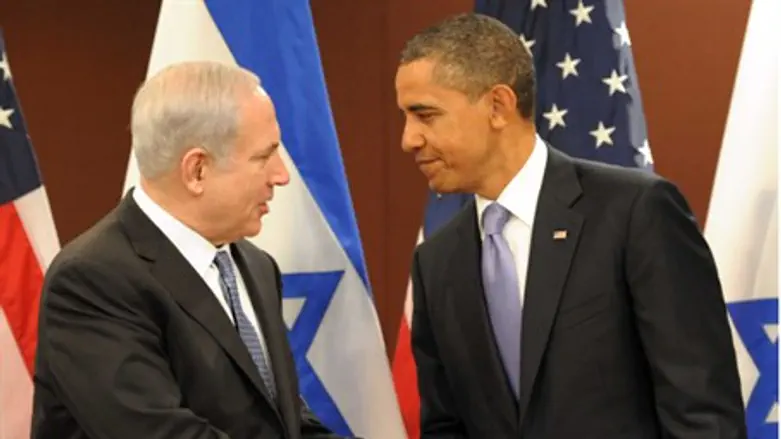
As President Barack Obama is set to arrive for his visit to Israel, the results of a new Gallup poll released Monday find that a majority of Americans prefer that, should the President choose to pressure one of the sides in the Israeli-Arab conflict over the peace process, he should choose to pressure the Palestinian Authority.
According to the poll, 48% of Americans say the United States should increase pressure on the Palestinian Authority to compromise in order to achieve peace, rather than on the Israelis. 25% believe that Israelis should be the ones to be pressured by Obama, while an additional 18% think the U.S. needs to ramp up pressure on both sides, or on neither.
The results are from Gallup's February 7-10 World Affairs survey. The previous two times Gallup asked this question, in 2007 and 2008, somewhat fewer Americans than today said the U.S. should lean more heavily on PA Arabs; however, it was still the modal response.
Anywhere from a slim to a solid majority of Republicans, conservatives, and adults with less than a college degree want the U.S. to put more pressure on the PA, Gallup found. By contrast, Democrats and postgraduates are closely divided in their views of where more pressure is needed, while liberals want the U.S. to put more pressure on the Israelis.
All age groups would put more pressure on PA Arabs than the Israelis, but this preference is more pronounced among older adults than among those aged 18 to 34.
A majority of Americans continue to support the establishment of an independent Palestinian state in Judea, Samaria and Gaza, the poll found. 44% favor establishing an independent Palestinian state, down from 51% in 2009 and 2012, while 37% oppose it. Nearly one in five, 19%, have no opinion.
The same groups that are more divided in their views of where U.S. pressure is needed or that lean toward pressuring Israel -- Democrats, liberals, and postgraduates -- broadly support an independent Palestinian state, including a striking 71% of postgraduates. However, pluralities of moderates, independents, and college graduates are also in favor. Republicans, conservatives, and adults with no college education are more likely to oppose than favor Palestinian statehood.
Obama recently signaled there would be no big Middle East peace initiative on the table when he arrives in Israel on Wednesday, for his first visit to the region as president.
During a meeting with American Jewish community leaders at the White House as he prepared for the trip, Obama said the visit was not aimed at resolving a "specific policy issue.”
The White House had clarified last month that Obama’s visit to Israel is not meant at presenting a new proposal for peace talks with the PA.
White House spokesman Jay Carney told reporters that the timing of the visit is intended to coincide with the beginning of the second terms in office of both Obama and Prime Minister Binyamin Netanyahu.
Last week Obama said in an interview with Israel’s Channel 2 News that his trip is meant to "listen" to both sides and hear their views on how to move forward after over two years without peace talks.
An earlier Gallup poll released on the weekend found that Americans' sympathies lean heavily toward the Israelis over Palestinian Authority Arabs, 64% vs. 12%.
In fact, the poll found, the 64% ties the highest Gallup has recorded in a quarter century, last seen in 1991 during the Gulf War. At that time, 7%, sympathized more with Arabs.
